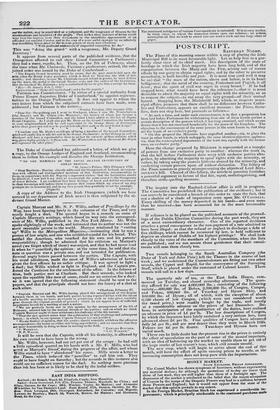Captain Marryat and Mr. N. P. Willis, author of Pencillings
by the Way, have been figuring lately in the columns of the Times, and very nearly fought a duel. The quarrel began in a remark on some of Captain Marryat's writings, which found its way into the correspond- ence of Mr. Willis, published in the New York Mirror. Mr. Willis spoke slightingly of the work, and intimated that its author was not the most reputable person in the world. Marryat retaliated by "cutting up" Willis in the Metropolitan Magazine,—insinuating that he was a person of low origin, and one who scribbled scandal for his bread. This nettled the American, who vouched for his own and his parents' respectability; though he admitted that his criticism on Marryat's novel (we forget which of them) was unjust, and that he had never read it when he " pencilled'; the opinion: at the same time, he said that the note in question was a private one, and not intended for publication. Several angry letters passed between the parties. The Captain, with his usual adroitness, made the most of Willis's admission of having given the first offence by an unfair critique. It was agreed to fight a a duel ; but Willis wished to fight in England, and the Captain pre- ferred the Continent for the settlement of the affair. In the fulness of time, both parties met at Chatham. But their seconds, who looked upon the squabble like men of sense, could see no occasion for a duel: so it was agreed that the following statement should be sent to the papers, and that the principals should not have the luxury of a shot at each other.
" Chatham. February 27. " Captain Marryat and Mr, Willis having placed the arrangement of the dispute between them in our bands, and both parties having repaired !tither with the intent of a hostile meeting, we have, presiously to permit Hug such to take place, carefully gone through the original grounds of quarrel ; which do not appear to us of sufficient importance to call for a meeting otaitch a nature. " We are perfectly borne out in this opinion by the arrangement of the fhb of February, entered into by the mutual friends of the parties; and on which we think Captain Marryat ought to have withdrawn his challenge of the 4th instant.
" That the new quarrel arises from the publication of that challenge and subsequent letters ; in which, in our opinion, Captain Marryat was not justified.
" We are further of opinion, that the parties should mutually withdraw the offensive eorrespoidenee, the terms on either side being unjustifiable ; and we conceive that they act more honourably in doing so titan in meeting in the field. " F. Masimrfter. " EDWARD BELCHER. N. P. Witt's. "J. G. WALKER."
It will be seen that the Captain, with all his dexterity, is allowed by his own second to have been in the wrong.
Mr. Willis. however, had not yet got out of the scrape : he had still a little episodical quarrel on his hands with a Mr. F. Mills, who had acted as Marryat's friend; during the progress of the affitir, and whom Willis stated to have " abandoned" his cause. Mills wrote a letter to the Times, which induced the "penciller" to call him out. They ought to have fought on Saturday; but the seconds in this instance also could see no sufficient reason for the duel. So nothing more precious than ink has been or is likely to be shed by the ireful scribes.


























 Previous page
Previous page